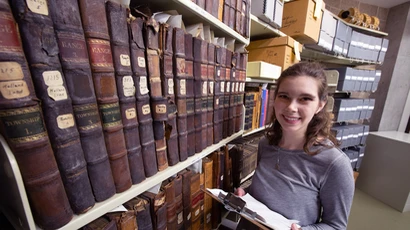History Department Fall 2021 Courses
- Methods courses to develop strong research and effective written and oral communication skills.
- Applied learning courses to engage in direct application of skills, theories and models to real-world settings, creative projects or independent or directed research.
- Survey courses in World, European, and U.S. History to better understand broad narratives of the past.
- Coursework in World, European, and U.S. History at the 300-level to strengthen content knowledge and historical skills.
(Open to all, but primarily for Majors and Minors. Will not fulfill Fredonia Foundations)
|
HIST 222: |
Dr. Nancy Hagedorn |
Survey of U.S. history from colonial times to 1877. Emphases vary with instructor, but will engage students with complex questions about the United States's role as a global leader in an increasingly interconnected world. The course will challenge students to think about what was -- and what wasn't -- included in the U.S. history narrative they learned in high school. |
|
HIST 232: |
Dr. John Arnold |
This course offers a broad narrative of European history from its origins through the sixteenth century. The course explores the development of various cultural and political traditions in the ancient Near East and Mediterranean, their intermingling during the Roman Era, and their transmission and transformation during the Medieval Era. |
|
HIST 243: |
Dr. Markus Vink |
This course examines the human pre-history and history 3500 BCE to the sixteenth century from a broad global perspective. Students will explore major themes such as the development of agriculture, the formation of cities and classical empires, the spread of universal and ethnic religions, and global integration and exchange. |
(Open to all. Will not fulfill Fredonia Foundations)
|
HIST 202: |
Dr. John Staples |
This course will combine historical research in the archives with practical experience contributing to the Historical Encyclopedia of Chautauqua County. We will begin in the SUNY Fredonia archives, researching Chautauqua County's past. In class we will focus on building the skills to tell the stories we discover, through careful research and good writing. We will also explore the nuts and bolts of publishing, formally addressing elements of the process ranging from properly citing primary and secondary sources, to copyright law, to copy-editing. In the end we will work together to expand the Historical Encyclopedia of Chautauqua County. The stories that you |
(Open to all, prerequisites may be needed)
| HIST 212: HISTORY OF THE HOLOCAUST | Dr. Eileen Lyon MWF 1:50-2:50, CRN 34994 | The Nazi murder of six million Jews and perhaps 10 million other people during World War II, for the sole purpose of eliminating undesirable people, may be the seminal event of the 20th century. The introductory, multimedia course surveys the Nazi programs of mass murder, explores their historical roots, and examines their consequences for our world today. |
| HIST 268: HISTORY OF SOUTH ASIA | Dr. Markus Vink TR 2:40-4:00, CRN
| Survey of the subcontinent from the Indus civilization to the present (3000 R.C.E. - 2000 C.E.). |
| HIST 288: THE ATLANTIC WORLD, 1500-1800 | Dr. Nancy Hagedorn TR 11:20-12:40, CRN 34794 | Introduces the concept of the Atlantic World as a focus for study. Integrating and comparing the histories of Europe, the Americas, and Africa, the course will consider key interpretive themes, including European exploration and expansion; imperialism and colonialism; the emergence of an Atlantic economy; intercultural interaction and exchange; and the establishment of the African slave trade and the plantation economy. |
|
HIST 303: |
Dr. John Arnold |
Treats the transformation of the Roman world from the Late Antique Empire through the formation of the monotheistic theocracies of the Carolingian Empire, the Byzantine Empire, and the Islamic Caliphate. Includes Late Antiquity, the Germanic invasions and kingdoms, the Byzantine Empire, the emergence of Islam and the Caliphate, Charlemagne, and the Viking Era. |
| HIST 310: GLOBAL ENVIRONMENTAL HISTORY |
Dr. David Kinkela
|
An introduction to the relationship between the natural environment and human development in the 19th and 20th centuries. Much of the history of humanity's interaction with the environment is one of catastrophes, but the course also investigates important and instructive examples of reform, reconstruction, and co-existence. |
| HIST 332: THE CIVIL WAR | Dr. Mary Beth Sievens TR 10:20-11:10 (CRN 34796) | The roots of the Civil War in antebellum northern and southern societies, war-time military, political, and social developments in the North and South, the Reconstruction experiment, the retreat from Reconstruction and the legacy of the war in the immediate post-war era and today. |
| HIST 343: THE CIVIL RIGHTS MOVEMENT | Dr. Jennifer Hildebrand MW 4:10-5:30 (CRN 34797) | This course seeks to expose the romanticized myths currently accepted as history among the general populace and to replace those myths with a better understanding of the goals, participants, issues and divisions that were a part of the African American struggle for freedom in the United States. |
| HIST 396: History of HIV/AIDS Epidemic | Dr. Jeffry Iovannone TR 11:20-12:40 (CRN 34798) | Description forthcoming |

